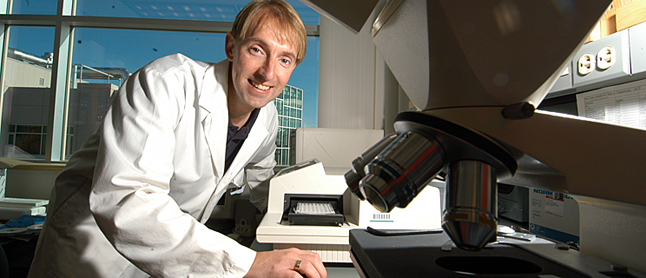UNBC Researcher Shares National Honour for Industry Collaboration to Improve Fish Farm Production
A fish biologist at the University of Northern British Columbia has been honoured by the National Sciences and Engineering Research Council of Canada (NSERC) for his efforts to improve the viability of farmed salmon in BC, and collaboration with industry. UNBC Ecosystem Science and Management Professor Mark Shrimpton shares the 2013 Synergy Award for Innovation for his work with BC fish farm Yellow Island Aquaculture (YIAL) on Quadra Island, and researchers from four universities across Canada.

Media Download: UNBC Ecosystem Science and Management Professor Mark Shrimpton in his lab at UNBC's Prince George campus.
The 27-year collaboration resulted in improved rearing techniques and genetic breeding stock, enabling YIAL to become the first commercial salmon farm in Canada to convert to 100% organic production of Chinook salmon. License capacity at YIAL has increased from 135 to 750 tonnes per year, and revenues have increased five-fold. In nearly three decades of operation there has been no impact on local marine conditions or fish populations, and no fish have escaped.
“We were all equal partners in the research,” says Dr. Shrimpton. “This work will help us both to feed the population and to protect our wild salmon resources.”
Dr. Shrimpton says his research has three main focuses:
- Understanding the role of genetics in fish performance. “We want to know how well these fish are growing. Are they staying healthy and disease resistant? Can they survive in both fresh and salt water? We want to learn how successful these fish are throughout rearing from egg to the market.”
- Understanding the effect of sterilization on fish. “We are investigating ways to create fish with an extra set of chromosomes that are sterile, do not become sexually mature, and will not breed with wild fish if they escape.”
- Understanding how sexual selection affects offspring performance. “Offspring of salmon from parents allowed to breed in spawning channels (sexual selection) and from parents spawned using current aquaculture practices (no sexual selection) were compared. There are economic benefits to allow fish to breed naturally as these fish grew faster with better disease resistance.”
YIAL’s revenues have also been boosted through the increased fish production, and decreased mortality in rearing stocks. Sales also increased with the development of the sterilization technology that prevents cross-breeding with wild salmon populations, and allows for a longer growing season.
“One of our goals at UNBC is to strengthen and foster the connections between research, industry, and communities. Research and innovation are instrumental to enhancing regional prosperity and wellbeing,” says UNBC Vice President of Research Ranjana Bird. “Dr. Shrimpton’s work is a perfect example of just such collaboration and I congratulate him on his success.”

Media Download: Mark Shrimpton, left, with His Excellency the Right Honourable David Johnston, Governor General of Canada. Photo Credit: MCpl Vincent Carbonneau, Rideau Hall